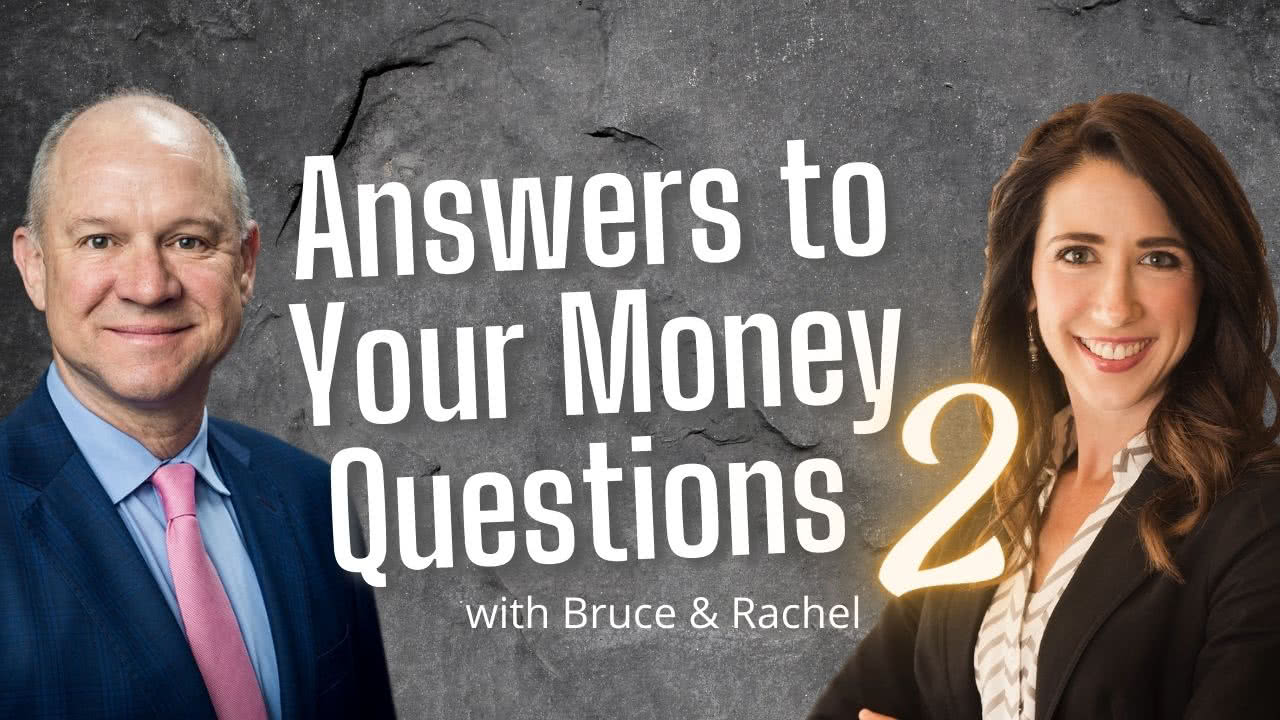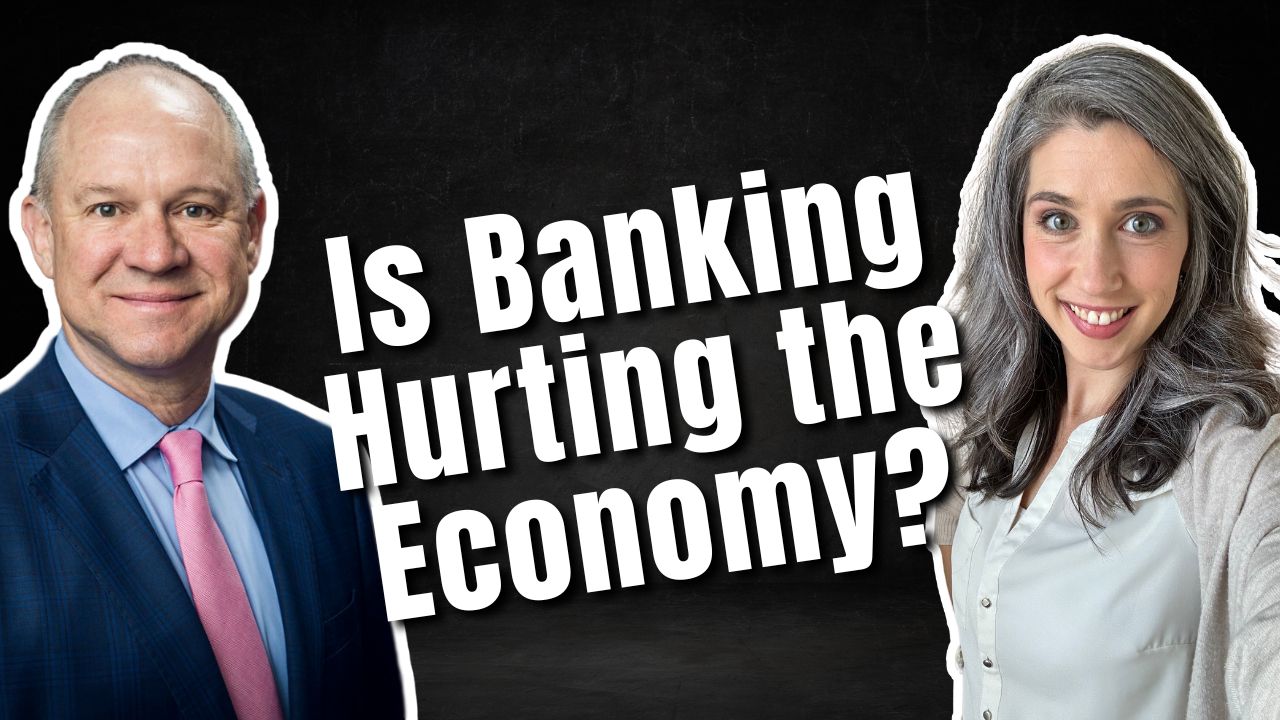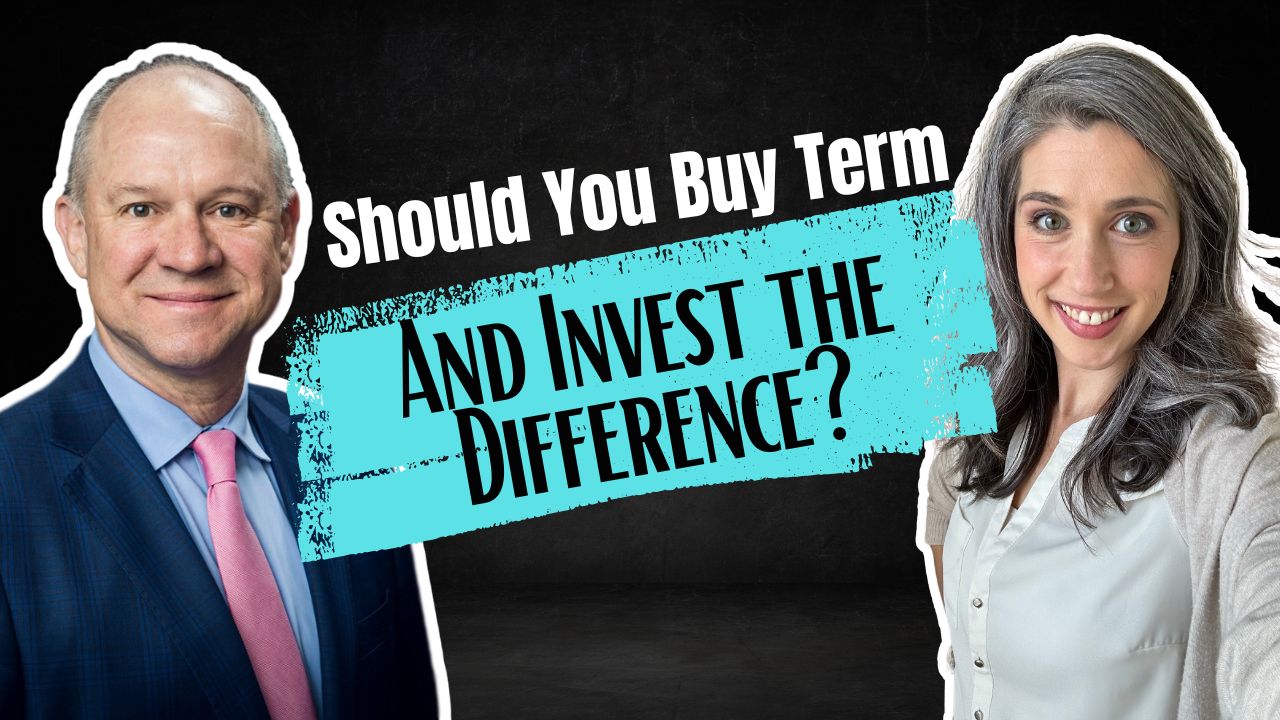
Answers to Your Money Questions, Part 2
We all have money questions. If you don’t, you just haven’t asked them yet.
Today, we continue to answer questions from you—our audience, tribe, fans, those in a quest to control their money and financial future! You can view part one of this conversation here.
There are some great ones here that might be on your mind too. So maybe you’ll get the answer you’ve been needing, so you can clear the hurdle and get one step closer to your goals… OR maybe it will prompt you to ask a question of your own… tune in now!
Podcast: Play in new window | Download (Duration: 1:02:11 — 71.2MB)
Subscribe: Apple Podcasts | Spotify | Android | Pandora | RSS | More
Table of contents
What Should You Do With Extra Cash?
In this instance, a listener named Matthew says he recently did a cash-out refinance. Now, he’s wondering what to do with the cash he has leftover.
Really, the answer depends: there’s no one-size-fits-all answer to this question (or in fact, many questions). The follow-up question that we would like to pose in return, is what is the purpose of your money? What do you want to accomplish with your money? You can approach this from the big picture as well as on a smaller scale, like what you want your money to do at this stage of your life.
If you’re unsure of what to do with extra cash and want to hone in on your money’s purpose, here are some clarifying questions:
- Does your money need to be accessible to you? Or is this money you are comfortable locking into an investment or other illiquid arrangement?
- Are you looking to create a cash-flowing asset that will create passive income?
- Do you wish to use this money for long-term growth? Or do you have a short-term opportunity?
- Is your emergency fund sufficient?
- Are you looking to take on some risk, or protect what you have?
It’s also okay to wait and be patient until you know what you want to do—or an opportunity presents itself. A privatized banking system may be a good way to store cash long term while you wait. Or you may want to park your cash short-term. You may want to do a combination of many things.
How Can Debt Be Advantageous?
Another listener mentions their interest in IBC, yet is unsure what the advantage is of funding a whole life insurance policy just to take a policy loan? They offer an example of funding a policy with $40,000 of cash value and accessing $36,000 to make a purchase, such as a car. By their calculation, they’ve funneled $76,000 into a $36,000 car.
This is an extremely important question and one that “makes or breaks” people’s understanding of IBC. Because this can be hard to wrap your head around, and it may take some “unlearning” of what you’ve been told about life insurance.
First and foremost, you can’t think of your life insurance premium as a “cost” to you. Instead, consider it savings that you can automate. Because the premium payments you make directly fund your cash value, which grows over time. It’s no different from paying money to the bank; or more directly, paying into your home and taking a home equity line of credit.
If you contribute $40,000 to your savings account, and then spend the savings, you’re not paying twice. You’re storing your money and then using it. A life insurance policy is another means of storing money, and a policy loan is another means of using that money.
The advantage of taking a policy loan, rather than a withdrawal from a savings account, is twofold. First, you have control. You can determine how fast, or slow, you pay the loan back. If you run into a lean year, you can make lower car payments if you want to (unlike a bank). You also own the car outright, rather than having a bank loan secured by the car.
Compounding Interest
Secondly, you have the power of compound interest. Say you paid for your car in cash that you withdrew from your savings account. While you’re not paying interest, you’re also not earning it. On the other hand, when you borrow money against your cash-value account, your money stays where it is. As such, it continues to earn interest, which has a compounding effect. The interest you earn also earns interest, and it picks up speed. So while you may be paying interest on a loan, you are also earning compounding interest.
Does this mean it always makes sense to take a policy loan? No. However, the cash value of your policy gives you many opportunities.
To learn more about policy loans: Privatized Banking – Life Insurance Loans and Why We Use Them
IBC Isn’t About Paying Off Debt
The primary reason for IBC is not to pay off debt. If you’re looking to be debt-free, or pay off debt as quickly as possible, IBC may not work for you. And that’s okay. IBC is really about learning to leverage money and make it work in multiple ways at once. This will often mean carrying and managing debt, depending on how you use your policy, and for some people this is uncomfortable.
To learn the best way to pay off debt: Cash Flow Index: The Smartest Way to Pay off Debt
Can You Withdraw Your Cash Value?
We don’t talk about this often enough, but yes, you can take your cash value back. However, a few things happen when you do this.
First, the death benefit of your life insurance is reduced. This is because your cash value is a component of your death benefit. If you reduce one, you reduce the other. You also lose the ability to put that cash value back into your policy. Once you’ve removed it, you cannot put it back. You can only pay your future premiums. Thirdly, you lose the power of compounding interest. Your cash value will continue to compound, however anything you remove will not earn interest (unlike taking a policy loan, which keeps your cash value intact).
Available Cash Value
If you’ve taken a loan against your policy, it’s important to note that your cash value is the collateral. When the insurance company sends you your statement, they may indicate your “available cash value.” If you have an outstanding loan, your cash value may appear much lower because you cannot have a loan larger than your cash value. As you pay down this loan, your cash value will become re-available to you.
Low Cash Value
If your life insurance policy is fairly new, you may look at your cash value and think it’s low. This is because of how life insurance contracts operate. At the beginning of a policy, the insurance company bears the risk because you haven’t paid many premiums—if you were to pass away, the company would owe the full death benefit, regardless of how much you have paid. As such, they keep more of the premium upfront, and less of it contributes to the cash value.
As time passes, the risk to the company decreases, and more of the premium contributes to your cash value. It’s common for your policy to “break-even” between the seventh and tenth year. In other words, this is when your cash value is equal to or greater than the premiums you’ve paid. It only goes up from there. And unless you withdraw, your cash value will never decrease.
So if you’ve begun a policy, and your cash value seems low, give it some time. Soon you’ll have a larger cash value to access.
To learn more about balancing early cash value and long term growth: Privatized Banking: High Cash Value and Long-Term Growth
What Happens if You Withdraw All Your Cash Value?
Many life insurance companies will not allow you to withdraw all of your cash value, though it depends on the company. When you do withdraw up to this point, however, your policy can turn into what is called an extended-term policy.
What Happens if You Collateralize All Your Cash Value?
To cover all our bases, we also want to address what would happen if you’ve maxed out your loan provision. There’s an important distinction between withdrawing your cash and borrowing against it.
And if you’ve taken loans out such that you cannot borrow anymore, don’t worry. Your cash value will continue to grow and earn interest. But beyond that, as you pay off your policy loans, what you pay off becomes available to you again immediately.
If you want more available cash value, you can either be patient and watch your policy grow, or you can pay down your loans.
Policy Collapse
Having maximized loans can be dangerous in some scenarios. It’s possible, for example, that your loans accrue interest faster than it earns interest. If money stops flowing into your life insurance policy through premiums and loan payments, your policy can collapse.
This is a rare circumstance, however, it can happen.
Is There a Difference in Dividends on Base Premium vs. PUA?
This is actually dependent on the product, rather than individual life insurance companies. However, the difference cannot be proven exactly, because the formulas each company uses to calculate dividends are proprietary information. If you extrapolate the numbers on your own, though, you’ll see that in some instances the dividends paid on the base premium was a higher percentage than that paid on the PUAs.
Other companies and products will pay the same percentage, however, they pay more Gross dividends on the base premium. This is because the death benefit factors into the equation, and there’s a higher proportion of death benefit on your base premium. Your PUAs will only buy you a very small fraction of death benefit, like dollars or pennies on the dollar.
Another factor that will affect how dividends are distributed is the construction of the policy. You can play with the ratio of your base premium to PUA, which will affect how your policy accumulates cash. Thus, it will also affect how dividends are paid.
There’s no simple yes or no answer in this case—rather it depends on several factors as you design your policy. And to say that there’s only one correct policy design doesn’t truly fit. The very first step is to determine the purpose of your money: then you can choose the ideal design for your goals.
To learn more about dividends: Whole Life Insurance Dividends Demystified, with Perry Miller
You can see some detailed examples and explanations of this in our course, Privatized Banking Secrets.
Do You Get Your Cash Value When You Die?
Unfortunately, there’s a huge misunderstanding that cash value and the death benefit are two separate things? This is, in part, due to the language that many people use around cash value. However, the cash value is really the portion of your death benefit that is available to you while you are alive.
So, rather than two separate buckets of money in a whole life insurance policy, you actually have one. Say you have $1 million of death benefit and $100,000 of cash value. Your death benefit is not $1.1 million, it’s still $1 million, and $100k is how much of it you can access.
This is why we like to think of your cash value as equity. Because if you sell your house, you will not get your equity and your home value, you’ll just get your home value, which includes your equity. Does that make the equity or owning a home worthless, or a scam?
Another thing to understand is that the death benefit is the future value of your premiums, calculated by the actuaries of the company. When you pay your premiums, they won’t give you full access to the death benefit because you haven’t paid that much yet. Your premiums are designed in a way that they are meant to pay for your death benefit by the time of endowment. If your premium is $1,000 then you’ve only paid for a small portion of your death benefit, accessible to you through your cash value. This allows you to have living value as well.
What Endowment Means
Your whole life insurance policy also has an endowment date. For policies established this year, endowment is when you hit the age of 121. Endowment means that at the specified age of 121, your cash value will equal your death benefit. In other words, you will have full access to your death benefit. If you are alive at this age, the company will pay out the death benefit to you while you’re alive.
And if you are designing your policy the way we talk about designing one, your death benefit will also increase over time. So while you may initially be paying for a $1 million death benefit, by the time of endowment, your death benefit could be several million dollars beyond that.
The guaranteed column of your life insurance illustration will show you your minimum guaranteed death benefit, and your non-guaranteed column will show you projections based on the current declared dividend. Every time your policy increases, that becomes the new “floor” of your policy, and it will not decrease from there. That includes increases in your total death benefit. This also means that your illustration will change every year, based on your actual dividends and any newly declared dividends for the year.
Can You Pay Premiums on a Monthly Basis?
Yes, in fact, there are four ways you can pay your premiums. You can pay them monthly, quarterly, semi-annually, and annually. However, the annual payment is going to be the lowest cumulative cost. This is because more frequent payments create an administrative drag. So, insurance companies want to incentivize annual payments. Cumulatively, monthly payments will cost the most. That does not, however, make them the “worst” option. Instead, monthly payments can actually be helpful from an opportunity cost standpoint.
For example, let’s say you pay your premiums from a savings account. If you paid in an annual sum of $50,000, you can no longer use that full $50,000 for an emergency or opportunity. While it will be available in your cash value, depending on how old your policy is, you might not have the full value of that premium accessible. If you choose to pay monthly, you can keep a larger amount of that money available in your savings account if needed. Determining your money goals can help with this.
You must also consider your personal integrity. If you want an annual payment, can you hold yourself accountable to have that premium in your bank account in a year’s time? If you choose monthly, will you be tempted to spend the remainder of that savings account?
Knowing yourself, your money, and your goals will go a long way. Fortunately, you can change the frequency of your payments at any time. So if you start with annual payments and decide you’d rather pay monthly, or vice versa, you can.
Book A Strategy Call
Do you want to coordinate your finances so that everything works together to improve your life today, accelerate time and money freedom, and leave the greatest legacy? We can help! Book an Introductory Call with our team today https://themoneyadvantage.com/calendar/, and find out how Privatized Banking, alternative investments, or cash flow strategies can help you accomplish your goals better and faster. That being said, if you want to find out more about how Privatized Banking gives you the most safety, liquidity, and growth… plus boosts your investment returns, and guarantees a legacy, go to https://privatizedbankingsecrets.com/freeguide to learn more.
Fractional Reserve Banking Creates Inflation: Infinite Banking is the Solution
Inflation causes everything to feel more expensive, so what do you do to protect your money from inflation? Today, we’ll explore the link between inflation and fractional reserve banking, and how Infinite Banking is the sound money solution. A thought-provoking journey through inflation, fractional reserve banking, and the revolutionary concept of infinite banking. This episode…
Read MoreBuy Term and Invest the Difference: Here’s What’s Wrong
Are you trying to decide which type of life insurance to buy? You want to protect your family in case something happens, so how do you do it best? Whole life insurance is often rejected as expensive and a poor “investment,” while mainstream opinion leans in favor of the “buy term and invest the difference”…
Read More


